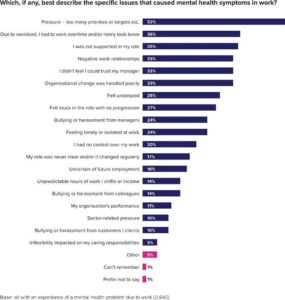Mental health
Report reveals 39% of employees have mental health issues as a result of work
Business in the Community (BITC) has created a call to action for employers on how to deal with employees with mental health issues, after report revealed 39% are suffering due to work-related stresses.
 A report conducted by BITC, in partnership with Mercer Marsh Benefits and BITC’s Wellbeing Leadership Team, ‘Time to Take Ownership’, revealed that most employers do not acknowledge or deal with the adverse impact work has on employees’ mental health.
A report conducted by BITC, in partnership with Mercer Marsh Benefits and BITC’s Wellbeing Leadership Team, ‘Time to Take Ownership’, revealed that most employers do not acknowledge or deal with the adverse impact work has on employees’ mental health.
The report sets out key recommendations to show businesses how to create positive, inclusive workplace cultures that help rather than harm the mental health of the people who work for them. These recommendations are proposed by Business in the Community, Mercer Marsh Benefits and nine key national partners.
4,000 employees in the UK took part in a YouGov survey based on workplace mental health.
The data revealed that 39% of them said that they have experienced symptoms of poor mental health related to work in 2019.
Out of the 39% admitting to workplace mental health issues:
62% of managers said they had to put their company’s interest above staff wellbeing.
The survey revealed a significant disconnect between company board members’ perceptions of how mental health is treated within their companies, and what the rest of the organisation thinks.
Louise Aston, Wellbeing Campaign Director at Business in the Community, emphasised that: “Those who want to be the best employers to attract top talent must remove the barriers to improving wellbeing, retention and productivity. Businesses are at their best when people are at their best. Let’s ensure people can bring their whole selves to work and thrive while they’re there.”
More than half of those at a CEO or board level believed that their organisation effectively supports its staff, compared with 38% of those without line management responsibilities.
Only 7% of all employees have received training to recognise workplace stress factors. One in three with mental health problems said that they felt ignored. 9% were subject to disciplinary action, demotion or dismissal following the disclosure of mental health issues.
One in ten workers resigned as a result, a figure which has plateaued since 2017.
Call to action
Tony Wood, Partner & UK leader, Mercer Marsh Benefits, said “despite some signs of improvements, more action is needed to improve workplace mental health. Instead of pushing managers towards tactical ‘band-aid’ solutions, company leaders need to think strategically. Doing the right thing for their employees is also doing the right thing for their business.
“By encouraging empathy and an inclusive workplace culture, built on a foundation of psychological safety, companies can ensure lasting change in how we deal with mental health problems.”
Based on the report findings, Business in the Community have made three calls to action for businesses to help achieve better mental health for the UK workforce:
- Create good work that enhances mental health. Good work is created by elements including security, fair pay and professional development;
- Acknowledge and support employees experiencing poor mental health, whatever the cause;
- Publicly report your wellbeing performance.
Louise added: “While mental health awareness has risen significantly in recent years, our research shows that too many employers are tinkering at the edges of change rather than making the fundamental differences that are really needed to improve their employees’ mental health.
People who come to work don’t expect to be physically injured and they should also not expect to be psychologically harmed. A profound cultural shift is paramount so that work itself doesn’t cause poor mental health but instead should enhance it.”
David Oldfield, Group Director, Commercial Banking, Lloyds Banking Group and Chair of the Wellbeing Leadership Team at Business in the Community ,concluded, “clear and consistent reporting of employee wellbeing helps to tell the real story of how poor mental health is impacting businesses, and what action we need to take to address the root causes. We know that what gets measured gets managed and mental health needs to be a strategic priority for all businesses.”
Report reveals 39% of employees have mental health issues as a result of work
BITC created a call to action for employers on how to deal with employees with mental health issues, after report revealed 39% are suffering from it.
Samah Ahmed
SHP - Health and Safety News, Legislation, PPE, CPD and Resources Related Topics
British Safety Council Wellbeing Conference: Empowering Employees for Success
New flexible working legislation – what does it mean?
Drug and alcohol testing in a UK airport environment


I wonder if anyone has spotted the announcement by the Human Rights Commission it is exploring introducing the “Right to READ” and thereby ensuring the functionally illiterate are enabled to participate in life-long learning. This also opens up the question of fluent reading disabled DSE operators suffering presenteeism, eye-strain and visual repetitive stress injuries resulting in the loss of their binocular vision?